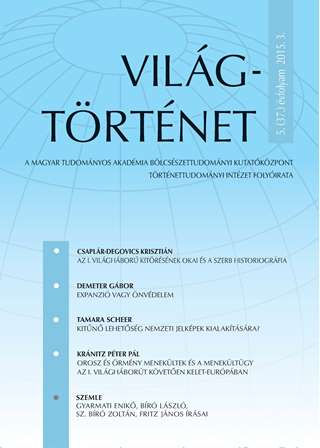Orosz és örmény menekültek és a menekültügy az I. világháborút követően Kelet-Európában, különös tekintettel Magyarországra
Russian and Armenian Refugees and Refugee Policies in East Europe After the First World War, With a Special Regard to Hungary
Author(s): Péter Pál KránitzSubject(s): Interwar Period (1920 - 1939)
Published by: Magyar Tudományos Akadémia Bölcsészettudományi Kutatóközpont Történettudományi Intézet
Keywords: refugee law; Russian and Armenian refugees; refugee policy
Summary/Abstract: The article depicts the first steps of the emergence of an international refugee law and institutions of refugee affairs in the contexts of Russian and Armenian refugees – fleeing war, persecution and genocide in Turkey and Russia – taking refuge in Northern-, Southeast- and East-Central Europe. It shows how the concept of the so called “repatriation” dominated the refugee policies of Bulgaria and Greece when it came to international (not Greek or Bulgarian) refugees. Through the 1920s, some 50 000 (later only 15 000) Armenian refugees were to be replaced in Soviet Armenia, and although such a mass deportation of refugees was not implemented, displacement of refugees in fact occurred. In terms of Armenian refugees, Romania had the most radical plan for a solution: the establishment of an allied military force defending Armenian territories. As for Russian refugees, the article demonstrates the numbers and general conditions of those taking refuge in Scandinavia, Finland, the Baltic states, Poland and Czechoslovakia, highlighting the falseness of a wide-spread topos of historical science, namely that the Russian refugees were a community of aristocrats, magnates and officers of administration or military. The article clearly demonstrates that an overwhelming majority of the Russian refugees were in fact laborers, workmen and peasants. Concerning Hungarian refugee affairs, a consequently adopted refugee policy can be drawn, as representatives of Hungary, over decades, maintained their distinct standpoints on one hand, on the possible lowest fee of identity certificates provided to Russian and Armenian refugees, and on the other hand, on the right of the refugees to return to the state that issued his/her certificate.
Journal: Világtörténet
- Issue Year: 2015
- Issue No: 3
- Page Range: 461-483
- Page Count: 23
- Language: Hungarian

